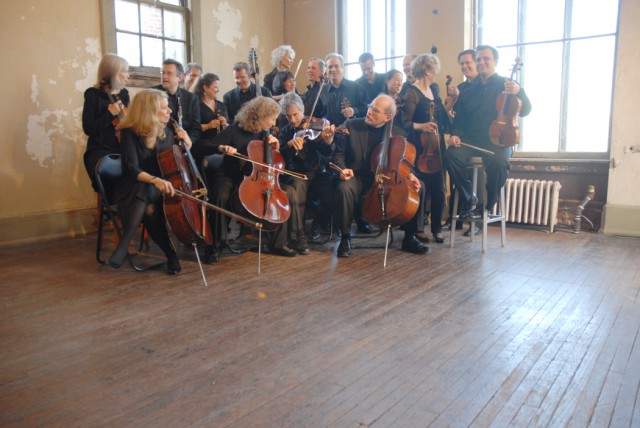
To an outsider, rehearsals of the Orpheus Chamber Orchestra may seem like chaos — but members insist it’s focused chaos.
The world’s best-known conductor-less orchestra — not leaderless, as they also insist — will perform tonight at 7:30 p.m. in Macky Auditorium with pianist Richard Goode. The program includes Schumann’s Piano Concerto and the “Italian” Symphony of Mendelssohn.
Even the members acknowledge that Orpheus rehearsals can seem chaotic, with everyone talking at once. But the musicians remain deeply involved in the music. And the results — 40 years of critical praise and audience response — suggest that their system of focused chaos works very well, thank you.
Orpheus was founded in 1972 as a way to extend the chamber music experience into a larger group, and to empower the members of the orchestra in ways that conductor-led orchestras don’t.
“It was not started because people didn’t like conductors,” violinist and current Orpheus member Ronnie Bauch explains.
“It really had nothing to do with conductors at all. It was more about the fact that in a traditional orchestra, you only use a small portion of the tremendous amount of study and education and experience that you have.
“In a traditional orchestra you get to play at a high level, but you don’t get to choose what you play, who you play it with or when you play it.”
To give the players a share of the leadership role usually controlled by the conductor, Orpheus has developed a way to share responsibility throughout the group.
“People used to call Orpheus the leaderless organization,” Bauch says. “It’s actually quite the opposite. It’s more of a leader-full organization.
“We took the natural leadership team that’s found in any orchestra, the principal players. They generally tend to be a passive team, the conduits for the conductor, but in Orpheus they are empowered to be an active team, to make decisions and to lead the rehearsal and performance process.”
Part of what makes Orpheus so successful is the way the leadership roles are rotated through the orchestra from one piece to the next.
“You might be concertmaster in one piece and in the next piece you’re sitting in the last chair second violin,” Bauch says. “That gives a sense of ownership to more people, but it also has a kind of disciplining effect, a kind of social control built into the system. So there is a hierarchy within the orchestra for every piece, even though the leadership rotates, and that hierarchy is responsible, to a great extent, for keeping order in the rehearsal.
“There will be moments of real focus where one person is speaking and everybody’s listening, and then there are other times when the whole violin section is turned around and they’re all talking, the oboes are talking to themselves, the cellos are talking to themselves, the brass are doing something else. It looks like chaos but it’s actually a highly efficient system, because each of these individual sections are solving multiple problems simultaneously. … It’s an efficiency that conducted orchestras can’t do, because if you have a problem in the viola section, you rehearse the violas and everybody else sits there quietly in down time.”
From the beginning, music of the Baroque and Classical eras has been the natural territory for Orpheus and other conductor-less orchestras. These are pieces that were originally led by a playing member of the orchestra — usually the first violinist — and they are still played that way today.
But over the years Orpheus has expanded its repertoire into the era of the all-controlling maestro, playing more and more music from the Romantic era — such as the Mendelssohn and Schuman pieces on the Boulder program. While this repertoire is more challenging for a smaller, conductor-less orchestra, Orpheus seems to thrive there just as it has with Bach and Mozart.
The Schumann Piano Concerto was suggested to Orpheus by Goode some time ago. He has partnered with the orchestra for more than three decades, and the years of rehearsing, performing, recording and touring together has built a strong bond between the pianist and the orchestral players.
“This is the first time we’ve ever played this piece together,” Bauch notes, “but it was something that Richard suggested years ago. It’s a very Romantic piece, but it’s not a traditional soloist-versus-the-orchestra concerto. I would say that the piano is less of an independent voice and acts more as a member of this extended chamber group, which is very fitting for Orpheus.”
Mendelssohn pairs well in Schumann — the two were friends and colleagues.
But more important for Orpheus, it was the musicians who chose what to play, who to play it with and when to play it.
Orpheus Chamber Orchestra with Richard Goode plays Macky Auditorium Thursday, March 21. Show starts at 7:30 p.m. Tickets start at $14. Visit bit.ly/OrpheusCU for more information.
Respond: [email protected]














